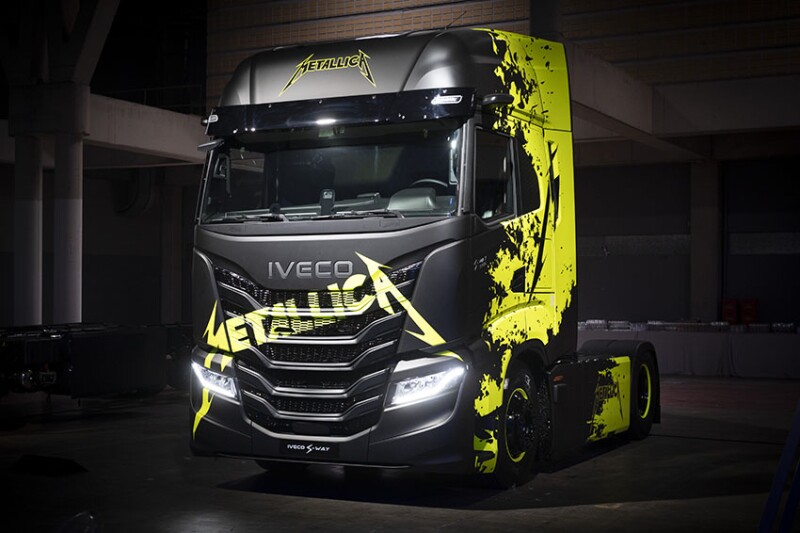Metallica, an iconic American heavy metal band, began the European leg of its M72 World Tour in Europe on 24 May, rocking in Munich, Germany. Although their high-decibel signature guitar riffs, dynamic drumming, and fast tempos have been widely celebrated and anticipated, their tour buses have attracted their own dedicated groupies.
These groupies are interested in the alternative fuels keeping the buses rolling on the 2-month, 7,200-mile journey across nine countries and include Shell, big-rig and electric vehicle manufacturers, and producers of hydrogen, biofuels, and LNG.
The band’s gear will be hauled using a diverse fleet of special-edition vehicles built by Italian manufacturer Iveco. Ten Iveco S-Way heavy-duty natural gas vehicles and four S-Way trucks powered by renewable diesel will utilize Shell’s refueling network. The fleet will include a convoy for additional logistics and show support, comprising two S-eWay trucks—the first fully electric heavy-duty trucks manufactured by the company—two S-Way LNG trucks, and one more S-Way powered by renewable diesel. An S-eWay fuel-cell truck will also join the convoy for the final Spanish dates. Iveco’s sister brand, Iveco Bus, will shuttle the band’s crew on-site at the venues with eDaily minibuses and an Evadys coach.
Shell’s renewable diesel, BioLNG, LNG, and FuelSave diesel will be used in the trucks. Iveco’s hydrogen fuel-cell trucks are powered by fuel-cell systems from HTWO, a hydrogen business brand of Hyundai Motor Group, and use hydrogen produced by Air Liquide.
The truck manufacturer displayed its first prototype of a heavy-duty fuel-cell truck in June 2023 during the opening of Air Liquide’s hydrogen refueling station in Fos-sur-Mer (Marseille). The large-capacity high-pressure station (1 ton/day) is supplied with hydrogen through pipeline and features a fast refueling time at 700-bar pressure.
The Fos-sur-Mer station is part of the HyAMMED project supported by French funding. The new station is also part of H2Haul, the European project cofinanced by the Clean Hydrogen Partnership. Air Liquide and Iveco were among the first partners of the H2Haul project when it was launched in 2019. A second high‑capacity station (700 bar, 2 tons/day) dedicated to heavy vehicles will be installed in Salon-de-Provence to supply a potential fleet of 50 hydrogen Iveco trucks from 2025 as part of the R’HySE project which aims to deploy new infrastructure to distribute hydrogen sources in the south of France.
Not Without Challenges
Although Europe has available more alternative-fuel infrastructure than the US, Metallica’s route is experiencing some issues.
The longest leg of the journey will be from Warsaw to Madrid, about 1,800 miles. Consider the following ranges of the Iveco tour trucks: EV models, 311 miles; LNG 994; and fuel cell EVs, 500.
Iveco CEO Gerrit Marx said in a recent Wall Street Journal article that the lack of charging and fueling stations between venues means the battery-electric and hydrogen trucks will be mostly for promotional use at concerts. Natasha Highcroft, a director of TransAm Trucking, which provides logistics for Metallica, added, “We use alternative fuels as and when we can, as much as possible, but until the infrastructure is there, it’s very difficult.”
“There is no silver bullet solution that alone will enable the whole transport industry to decarbonize. Instead, we are seeing a range of alternative fuels available and being developed, each with their own strengths and weaknesses. The key is to evaluate each and see which is the best fit,” wrote Volvo Trucks Environment and Innovation Director Lars Mårtensson on Volvo’s website.
This tour fits the bill by providing a real-world example of the use of various alternative fuels on a large scale, and how far innovation and development have come.
Metallica’s high profile and popularity draws attention in much of the world. Less so may be the carbon footprint associated with the metal band genre.
A 2022 study by Power Play used Billboard rankings to find the most-popular touring musicians in six genres, then analyzed their 2022 tour dates to estimate their carbon emissions. The estimates considered factors such as total flight and total driving emissions (metric tons of CO2), average distance traveled per tour, and average number of shows.
Metallica ranked No. 6 in the top 10 emitters in the metal genre for total flight (804 metric tons of CO2) and total driving emissions (40 metric tons of CO2).
Iveco said in a statement, “Metallica will make a significant leap forward on its decarbonization journey. Environmental sustainability and social responsibility are the common ground on which the partnership between Iveco and Metallica is built.”
The truck manufacturer aims to keep the buzz alive. In the latter half of the year, it will offer a limited run of 72 heavy-duty trucks with “exclusive outfitting inspired by Metallica.”
For Further Reading
Iveco Goes Big, Focus on Transport and Logistics.
What Is the Best Alternative Fuel for Heavy-Duty Trucks? by Lars Mårtensson, Volvo Trucks.
Bands With the Biggest Carbon Footprint, Battle of the Bands: 2022 Emissions Edition, Payless Power.


